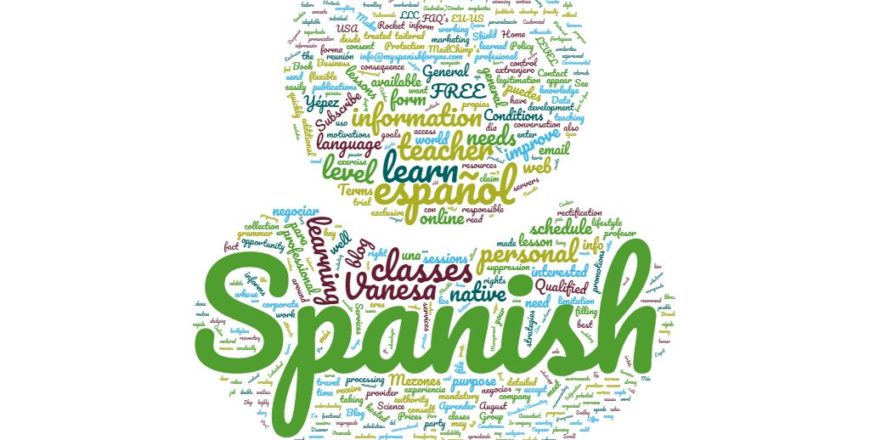Spanish for IGCSE Students Free Material

SPANISH FOR IGCSE STUDENTS
Spanish is one of the most widely spoken languages. It is the second language in the USA and second most popular language in Europe after English. It is the official language in 21 countries around the world including Spain. Spanish is becoming more and more important with respect to business needs. Imagine learning the second most-spoken language in the world, being able to communicate with people from all the continents (yes, Spanish is an official language in at least one country in each populated continent).
WHY IS THIS COURSE IMPORTANT?
Are you career-oriented? Would you like to get a better job or have several employers throw offers and counteroffers in a scramble to hire you? Then start learning Spanish now!
It does not matter if you want to stay in America or you plan on finding a job abroad—the fact remains that with the number of Spanish speakers growing, sooner or later you will have to attend to a patient who only speaks Spanish or help a South American client get their taxes sorted.
If you are a translator or an interpreter, mastering Spanish can open a whole new world of documents that need to be translated and people who will hire you to interpret for them while at a meeting or an interview.
Learning Spanish will add that final touch to your resume that will make you stand out among the rest of candidates who are applying for that job you so want to get.
However, if you do not want to change your career or leave your job, Spanish is also a great asset that can help you get promoted at your current place of employment!
Maybe your bosses want their managers to speak three languages fluently. Maybe the company is opening a new branch office in Venezuela and they are looking for an American with fluent Spanish to be their international director. Or maybe your employers are like many others who value foreign language skills in their employees.
You never know! There are so many ways of going up the ladder just by learning Spanish.
HOW TO PREPARE FOR THE COURSE?
- Do past papers. You’ll be able to find them online, and you can print them out and fill them in
- Listen to Spanish radio
- Watch Spanish TV/films with subtitles
- Find a native Spanish speaker
IMPORTANT MATERIALS
E-BOOKS:
- Cambridge IGCSE & International Certificate French Foreign Language (French Edition) ( PDFDrive ): https://drive.google.com/file/d/1MYIF_CpcfIASnxBEKJl1IWSEfgvZIm1W/view?usp=sharing
- Cambridge IGCSE and International Certificate_ Spanish Foreign Language ( PDFDrive ) : https://drive.google.com/file/d/1udpH_JiA1JY4xWNQaLWBCfGQegwHxEYR/view?usp=sharing
- Cambridge IGCSE English as a Second Language ( PDFDrive ): https://drive.google.com/file/d/1I1JCxGSDvqEHK0v7JepiH7CJMMWo1889/view?usp=sharing
- IGCSE English as a Second Language – Focus on Writing ( PDFDrive ): https://drive.google.com/file/d/1vJZ0Ph72suKSqL-aPZiHQ2sQ0ELroMBx/view?usp=sharing
- Streetwise Spanish _ Speak and Understand Everyday Spanish ( PDFDrive ): https://drive.google.com/file/d/1eBX32lc_P1OqS4kXEM49Bn3BvD_p44k6/view?usp=sharing
VIDEOS:
- Spanish GCSE 9-1 Topics: Last-minute Topics revision 2019: https://www.youtube.com/watch?v=WYgMCzWALIo
- Spanish GCSE 9-1 Topics: Last-minute Grammar revision 2019: https://www.youtube.com/watch?v=g_TZ8KRq9a4
- How to get full marks in the 150 word higher writing – SPANISH: https://www.youtube.com/watch?v=8C8BSCwwwRQ
- SPANISH LISTENING PRACTICE | 30 Minutes of Spanish Listening Practice | NOTILOCA #1: https://www.youtube.com/watch?v=vN9_89oAQSs
- How I Got a 9 in GCSE Spanish – You Can Too: https://www.youtube.com/watch?v=-Dxz49bU66c
IMPORTANT TIPS:
- Speak loudly and clearly – it must be clear if the examiner is to hear all the good bits!
- Reply in full sentences to ensure you maximize your use of verbs.
- Try to say as much as possible for every answer you give. Extend your sentences by explaining and describing people/events in detail.
- Use a variety of tenses (past, present, future, conditional) wherever possible.
- Include attitudes and opinions (with reasons/justifications) for every answer.
- Talk in the 3rd persons (he/she/it and they) as well as the 1st persons (I/we).
- Given personal accounts, these will undoubtedly be original.
- Use your imagination – this is one exam where it doesn’t all have to be totally true!
- Use idiomatic expressions to make yourself sound more like a native.
- If you need time to stop and think, mask the hesitation with ‘fillers’ (‘well’…’er’ etc.) from the target language just as a native speaker would.
- Have plenty of learnt vocabulary/verbs ready to use, this will help you vary your language.
- Get plenty of practice and preparation answering the sorts of questions that may come up.
- Find out from your teacher examiner if he/she will be willing to practice with you in advance, as this will allow you to get used to their voice/accent and style of questioning.
- Get a good night’s sleep and eat/drink before the exam. You need brain power and energy to concentrate!
